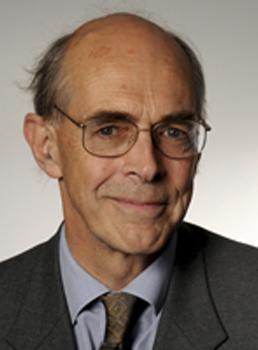Wycliffe College holds a special place in the heart of world-renowned theologian and Christian ethicist, Oliver O’Donovan. He met his wife here 40 years ago; the couple was married in Founders’ Chapel and held their reception on the College grounds. Communications director Patricia Paddey sat with O’Donovan (during his recent visit to the College to teach a course) and recorded their conversation.
Q: You first taught at Wycliffe in the late 70s and early 80s. What is it like for you to return to here?
OO: It’s always a pleasure. It’s nice to see Wycliffe growing, and growing strong since I left it all those years ago. There’s still very much a sense of the same common purpose. The context is quite different today with changes in the churches, but I feel a sense of identification and recognition.
Q: What do you see as being Wycliffe’s unique contribution to the church and to the world of Christian scholarship?
OO: There are two levels at which Wycliffe contributes. One is in preparing people for ministry. And I would hope to see—and have in the past seen coming out of this College—clergy who are both deeply thoughtful and deeply loyal, who have a commitment to a biblical gospel but are not glib in the way they understand it and proclaim it. I look to Wycliffe to maintain a kind of stable grounding principle in the Canadian church at a time when the church is very easily blown to own side or the other. In the academic world, academic theology remains urgent for us, even though it’s harder and harder to sustain in the current context. Toronto presents a unique context, and Wycliffe’s central participation in the Toronto School of Theology is one of its greatest strengths; it means that its strengths are both available to a much wider set of traditions and that they are contextualized for people who study here.
Q: You’re teaching a course called “Ethics as Theology.” How does ethics become theology?
OO: If I could tell you in a sentence how Ethics became Theology, I shouldn’t have to teach a course! The ultimate questions of ethics are theological. The penultimate questions are not always so, but to comprehend what moral reason is about, and how it must proceed in a way that satisfies our need for fulfilled lives, Ethics must be set in the context of the human relationship to God.
Q: What do you think will be the single most important ethical issue facing the church in the next decade?
OO: I am no prophet, nor a prophet’s son. People expect ethicists to be seers, but I am not, and I don’t think an ethicist can be one. Yet I can have speculations and anticipations, as anyone else can, and those are that two issues may become very important to us. One is the responsibility for nurturing and sustaining life; the problematics of technological medical power have by no means been resolved. The other issue, I fear, is war. The question of nuclear war, which everybody cheerfully brushed aside as disposed of in 1990 and 1991, is coming back to haunt us, and we shall not get away without addressing it.
Q: In the preface to Entering into Rest, you write that “The last thing that could benefit Theological Ethics at this point would be yet another reduction of the moral message of the Christian Gospel to a single word, or even to three words.” What is the first thing that could benefit Theological Ethics?
OO: The opposite of that, an expansion of our moral vocabulary. A relearning of some old words, and a willingness to draw upon a wider range of descriptions, a wider conceptuality for understanding our situations. Moral thinking is discursive thinking; it moves from A to B; it doesn’t stand still in a single spot and simply pronounce.
Q: These are interesting times. What word of encouragement or challenge do you have for believers in navigating them?
OO: The encouragement that believers must turn to is the ongoing work of the Holy Spirit, who does not desert the community of the faithful. The Spirit surprises us, and leads us in ways we had not worked out beforehand. I have no doubt that that will be the case in the next decade. Perhaps some of the surprises will be unpleasant, because new challenges aren’t always pleasant. But it is God who leads. That is the supreme encouragement. And if we will follow, if we will be attentive, we shall be led to ways of being faithful witnesses.
The challenge is to give our minds and attention to the deposit of faith and to the Scriptures. We must constantly renew our study, and make use of the resources we have been given, not abashed or discouraged by the fact that as Christians we never think exactly the same as everybody else around us.
Q: You’ve spent a lifetime wrestling with ideas. What advice would you give to disciples of Jesus who are just setting out on this journey?
OO: To those who have an academic or reflective vocation the advice I would give is, know your texts first-hand. Don’t be content to repeat what the last scholar said about them, but live with them, and use them to illuminate the problems that confront you, understanding their historical setting on the one hand, but not afraid to hear them speaking on the other. There is always the temptation to push texts back into their own past, so that our study becomes purely antiquarian. That is bad for theology, which needs to let its texts speak back to us as they are capable of speaking.





